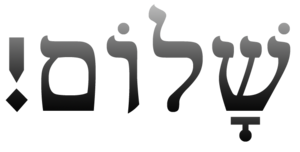Insight into Hebrew: Shalom! Posted by Sean Young on Mar 29, 2013 in Learning Hebrew
 Shalom is a Hebrew word meaning peace, completeness, prosperity, and welfare. It can be used idiomatically to mean both hello and goodbye and it can refer to either peace between two entities, or to the well-being, welfare or safety of an individual or a group of individuals.
Shalom is a Hebrew word meaning peace, completeness, prosperity, and welfare. It can be used idiomatically to mean both hello and goodbye and it can refer to either peace between two entities, or to the well-being, welfare or safety of an individual or a group of individuals.
Shalom by itself is used in Modern Israeli Hebrew as a greeting, to which the common reply is, שָׁלוֹם שָׁלוֹם. It is also used as a farewell, making it similar to the Hawaiian aloha, the English good evening or Hindi नमस्ते (namaste).
Other uses of שָׁלוֹם
The word “shalom” can be used for all parts of speech; as a noun, adjective, verb, adverb, and interjection. When used as a noun shalom refers to welfare (health, prosperity and peace).
In the Scriptures, shalom describes the actions that lead to a state of soundness, or better yet wholeness. So to say, shalom seems not to merely speak of a state of affairs, but describes a process, an activity, a movement towards fullness.
Other greetings and expressions
The word shalom is used in a variety of expressions and contexts in Hebrew speech and writing:
Shalom aleichem (שָׁלוֹם עֲלֵיכֶם) is used to greet others and is a Hebrew equivalent of “hello”. The appropriate response to such a greeting is “upon you be well-being” (עֲלֵיכֶם שָׁלוֹם aleichem shalom). On Erev Shabbat (Sabbath eve), Jewish people have a custom of singing a song which is called Shalom aleichem, before the Kiddush over wine of the Shabbat dinner is recited.
Shabbat shalom (שַׁבָּת שָׁלוֹם) is a common greeting used on Shabbat. This is most prominent in areas with Mizrahi, Sephardi, or modern Israeli influence. Many Ashkenazi communities in the Jewish diaspora use the Yiddish Gut shabbes in preference or interchangeably.
Alav hashalom (עַלָיו הַשָּׁלוֹם; “upon him is peace”) is a phrase used in some Jewish communities, especially Ashkenazi ones, after mentioning the name of a deceased respected individual.
Oseh shalom עוֹשֶׂה שָׁלוֹם is the part of a passage commonly found as a concluding sentence in much Jewish liturgy (including the birkat hamazon, kaddish and personal amidah prayers). The full sentence is
עוֹשֶׂה שָׁלוֹם בִּמְרוֹמָיו, הוּא יַעֲשֶׂה שָׁלוֹם עַלֵינוּ, וְעַל כָּל יִשְׂרָאֵל וְאִמְרוּ אָמֵן
, which translates to English as “He who makes peace in His heights may He make peace upon us and upon all Israel; and say, Amen.”
Related words in Modern Hebrew include l’shalem (לְשַׁלֵּם), “to pay” and shalem (שָׁלֵם, “complete”.
Cultural Awareness
As a Jewish religious principle
In Judaism, שָׁלוֹם is one of the underlying principle of the Torah. “Her ways are pleasant ways and all her paths are shalom.” The Talmud explains, “The entire Torah is for the sake of the ways of shalom”. Maimonides comments in his Mishneh Torah: “Great is peace, as the whole Torah was given in order to promote peace in the world, as it is stated, ‘Her ways are pleasant ways and all her paths are peace. ‘”
Shalom as a name for people
- Shalom is commonly used as a person’s name oe surname in modern Israeli Hebrew.
- Related male names include Shlomi (Hebrew name) (“my well-being”) and Solomon (Hebrew Shlomo).
- Related female names include Shulamit, Shulamith, Shlomtzion or Shlomzion and Salome and Shlomith.
- Shalom Aleichem was the pseudonym or pen name of Shalom Rabinowitz, whose work, Tevye and his Daughters, formed the basis for Fiddler on the Roof.

Build vocabulary, practice pronunciation, and more with Transparent Language Online. Available anytime, anywhere, on any device.
About the Author: Sean Young
Learning languages since 1978 and studying over 50 (achieving fluency in 10). Sean L. Young loves giving tips, advice and the secrets you need to learn a language successfully no matter what language you're learning. Currently studying Hindi and blogging his progress right here at Transparent Language - https://blogs.transparent.com/language-news.




Comments:
hansolmana:
awesome to know the fullness and wonder in the Hebrew language
damian:
having only learnt hebrew by rote it is great to learn more nice site thank you
David:
I enjoyed your blok, thank you.
From Hebrew First on Fb.
Thank you.
AE. Anderson:
You forgot:
שלום על ישרא ל
as an exclamation used when another voices a vexing idea that portends unwanted or unwelcome consequences.
Sue Campbell:
Can the word “salome” be used like the word “shalom”? Thanks for your help!